Richard Goodman's Blog, page 15
February 22, 2023
Charlie and the Censorship Factory
Did you happen to see the recent article in the New York Times about how Roald Dahl’s books are being altered? And not by him, since he died in 1990.
The headline of the article was: “Roald Dahl’s Books Are Rewritten to Cut Potentially Offensive Language.”
The author’s estate says that passages “have been rewritten in an effort to make them less offensive and more inclusive.” Now, what sort of passages are we talking about? A British newspaper reports that changes “include characters who are no longer described as ‘fat’ and references to ‘mothers’ and ‘fathers’ that have been updated to ‘parents’ or ‘family.’” Thank God they excised “mothers” and “fathers.” I feel more secure already.
 New and improved!!!
New and improved!!!Who makes these decisions? And whose books are next?
Is the goal of being more inclusive and trying to discourage stereotypical language a laudable one? Certainly. But. Here, I want to turn to the author of The Golden Notebook, Doris Lessing, for help. In a prescient article written more than thirty years ago for the New York Times, titled, “Language and the Lunatic Fringe,” she wrote, “Does Political Correctness have a good side? Yes, it does, for it makes us re-examine attitudes, and that is always useful. The trouble is that, with all popular movements, the lunatic fringe so quickly ceases to be a fringe, the tail begins to wag the dog. For every woman or man who is quietly and sensibly using the idea to examine our assumptions, there are 20 rabble-rousers whose real motive is desire for power over others, no less rabble-rousers because they see themselves as anti-racists or feminists or whatever.”
 Doris Lessing, seer
Doris Lessing, seerShe saw the movement to control language as emanating, perhaps not consciously, from communism and its “debasement” of language. Please read the entire article. I can’t do it justice. She also writes, “There is obviously something very attractive about telling other people what to do.”
In that recent article, the Times quotes Suzanne Nossel, chief executive of PEN, the esteemed literary organization: “Those who might cheer specific edits to Dahl’s work should consider how the power to rewrite books might be used in the hands of those who do not share their values and sensibilities.”
In other words, ask not for whom the censoring bell tolls, it may well toll for thee.
February 15, 2023
Joining the Salon des Refusés
Thirty years ago, I was at the MacDowell Colony for an artist residency. It was the summer of 1993. It was my first time as a MacDowell Fellow, as they’re called. It was strange, wonderful, intimidating. Very intimidating.
In case you don’t know anything about MacDowell, it’s a place where artists of all genres can go and work and not have to worry about mundane things like making lunch or dinner, or rent, or finding a place to do their work. That’s all provided for you. That is, if you get a fellowship. The competition is fierce, especially for the summer residencies. MacDowell is located in Peterborough, a pretty town in southern New Hampshire. I’ve heard it’s the town that Thornton Wilder’s Grover’s Corners from Our Town is based on. Who knows?
 Main building at the MacDowell Colony
Main building at the MacDowell ColonyMany famous artists have been in residency there. Leonard Bernstein, James Baldwin, Willa Cather, Alice Walker, Jonathan Franzen, to name a few. The only other place with the same prestige and pedigree is Yaddo, an artist colony located in Saratoga Springs, NY.
I went to MacDowell as a forty-eight year-old first-time author. Each artist is given a studio to work in that is theirs and theirs alone for their residency. Mine was a small but warm cottage at the end of a tree-lined fifteen-minute walk from the main building.
 The studio at MacDowell where I worked. Or tried to.
The studio at MacDowell where I worked. Or tried to.I was completely overwhelmed at MacDowell. It was a remarkable feeling to be part of an artistic dramatis personae and tradition of the highest order. But that was part of the problem as well. Everybody I met had so much more confidence and accomplishments than I. Not everyone was famous, but most everyone seemed more confident.
All the artists met for dinner, and it soon became clear there were cliques, just like high school. I say just like high school, because I found these cliques to be just as excluding and aloof as those in high school. I remember I went to sit at a table with some artists—there were two or three vacant chairs—and I was told not to sit there. Outright. Others were coming, I was informed. There were officially no reserved seats at MacDowell. Yet, it appeared there were. I remember one writer, a well-known poet from New Jersey, celebrated for his humor, was particularly nasty about it. I felt small.
I retreated to a table in the far reaches of the dining room. There, as it turned out, were fellow artists like myself who were, or felt, excluded. It was there I found my people.
One of them was the poet Renée Ashley. She’s one of the most delightful artists I’ve ever met. She, like me, had felt rejected. But, unlike me, she was more than up to the challenge of that rejection. She started a group she called the Salon des Refusés, the “salon of the refused,” named after the famous French Salon des Refusés of 1863 in Paris. That exhibition included works by Manet (Le Déjeuner sur l'herbe) and others that had been rejected by the Academy of Fine Arts. I, and a few other similarly rejected artists, happily joined her salon.
 Renée Ashley, poet and rescuer
Renée Ashley, poet and rescuerI loved being part of the Salon des Refusés. Renée was one of the drollest people I’d ever met. She took the idea of the Salon and ran with it, creating events for us that satirized our own outsider-ness and those who excluded us. We had our own readings, and I believe we gave ourselves names reflecting our Refusés status. I think I was “the refused nonfiction writer, Richard.” I wish I remembered the other members of the Salon, but I do not. By the way, Renée is a very very fine poet. She had published her first book, Salt, in 1991. She had a copy, and I read it and loved her work as much as I did her.
 Renée’s wonderful poetry I read while at MacDowell
Renée’s wonderful poetry I read while at MacDowellShe’s had a distinguished career as a poet and teacher, and I hear from her from time to time, and I am always happy when I do. I don’t think I’ve ever needed to laugh more than those weeks I spent at MacDowell. I remember bending over in laughter with her. She had the driest delivery, and I adored her for creating a refuge for we who were refused. I am still grateful to her.
I have always been proud to have been part of the Salon des Refusés. I consider that I still am a member. Sometimes being rejected may be the best thing to happen to you. It was for me.
February 5, 2023
Enter the dog
My girlfriend and I got a dog. As with many people who get a dog, we really didn’t know what we were getting ourselves into. It’s a puppy, a female, and she was about eight months old when we got her. A puppy is essentially a toddler in fur, and you had better be prepared for all sorts of non-negotiable demands plus continual acts of creative destruction. We’re still learning these things. And as with a toddler, say goodbye to a neat domicile.
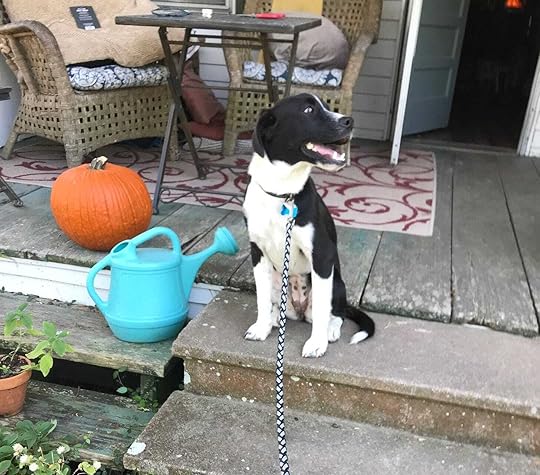 First day in her new home
First day in her new homeWe got our dog from a no-kill shelter. She’s a black-and-white medium-sized dog of indeterminate breed. The vet declared that she has some terrier in her, and that appears to be true, but she has a smattering of other breeds flowing through her as well. We think some Labrador and perhaps some kind of Pointer. She has a charming underbite. One man at the dog park said, “She definitely has border collie in her.” She weighed 35 pounds when we brought her to the vet for the first time.
 Relaxing at home
Relaxing at homeWe named her Manon. My girlfriend Gaywynn, a Cajun girl, wanted a French name. I don’t remember how long we pondered this, but Manon is what we chose. No one we meet says the name correctly the first time or knows what it means or where it came from. There are two operas with the name Manon in their title, and there is the 1986 French movie, Manon des Sources (Manon of the Springs) from the novel with the same name by the wonderful Provençal writer, Marcel Pagnol. Gaywynn likes to point out that the name means “beautiful queen.”
 Further relaxing at home.
Further relaxing at home. And our dog certainly acts like a queen.
I had dreams that the dog and I would form one of those Lassie-like bonds, that we would fall in love with each other and become inseparable, walking along some wooded trail, something from a book cover. Instead, Manon fell in love with Gaywynn. She has been wary of me from Day 1. When we come back from a trip to town without her, she’s all over Gaywynn and treats me like I’m some sort of bill collector. We’ve had her for about four months now, and she’s warmed up to me only just slightly. And that tepidness is subject to change, often shooting to lower temperatures. I tell myself Manon must have had some trauma with men before she came to the shelter, and then to us, but maybe she just doesn’t like me. My brother, wag that he is, said, “Well, dogs can sense things….”
She’s a peculiar dog in some ways. Not like any dog I’ve had or known before. She didn’t bark at all for the first month or so, at all—not once. The day she did bark for the first time shocked the hell out of us. You can bark? She can be stubborn, too, refusing to move when you take her outdoors. We don’t know why. When I look at her sometimes, she has an enigmatic stare that makes me wish I knew what she was thinking.
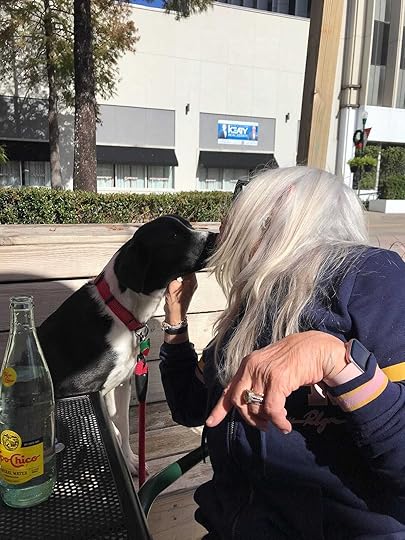 At an outdoor restaurant with her favorite human, Gaywynn
At an outdoor restaurant with her favorite human, GaywynnShe chews. Everything and anything. She’s a genius at finding things to chew. I have seen her extract a single magazine from a rack of magazines in our home with her teeth and bring it to the couch to shred it. She once managed to purloin one of Gaywynn’s earrings—while Gaywynn was wearing it. She was sitting next to Gaywynn when we were watching TV, and we began to hear a sound like someone was biting a rock. It was Gaywynn’s earring that Manon was attempting to chew. How she took it from a living ear without the owner noticing, we don’t know. But it’s a feat worthy of David Copperfield. Items she has chewed to smithereens or beyond use are: shoes, sweaters, shorts, TV remote (twice), thermometer, books, chopsticks, upholstery (couch, chair), bra—what else? You name it, she’s chewed it. Or will. Yes, we’ve bought her innumerable chewable toys. She still goes for our stuff.
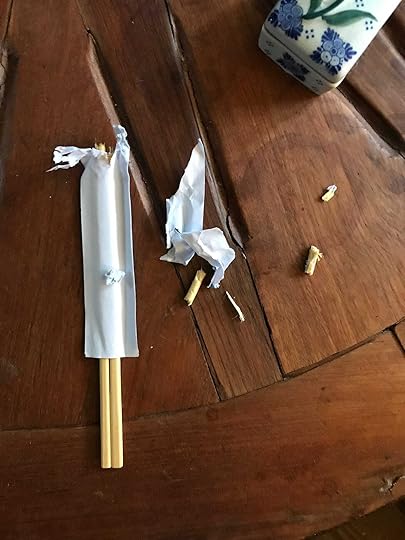

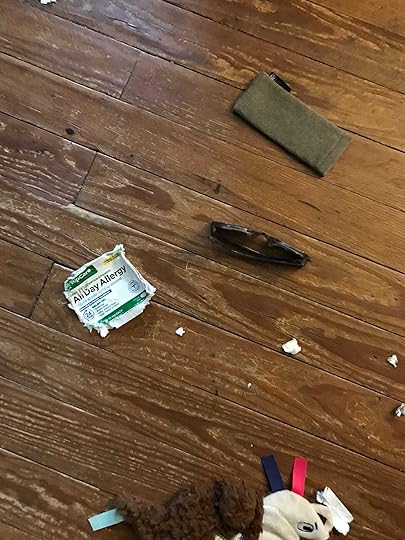 Some of Manon’s handiwork
Some of Manon’s handiworkShe’s very social. She likes other dogs and people. She loves going on excursions. (I’m beginning to sound like one of those descriptions they put up on shelter websites or on Petfinder. “Adopt her now!! She’s ready to love you!!!!”) She’s lightening quick and runs faster than a speeding bullet. She goes absolutely out of her mind, like a Walmart shopper on Black Friday, if she sees a squirrel or a rabbit. Her ardor is so strong, I’m tempted to let her go, but that could prove disastrous for both animals.
We have a cat. Actually, it’s Gaywynn’s cat. Her name is Grace. That’s a name no one has trouble with. They don’t ask us what it means or how to pronounce it. Manon wants desperately to play with Grace, but Grace is highly uninterested. Manon runs after Grace who occasionally will hiss and swat, but not with much conviction. Generally, they get along fine, especially since Grace can leap up on tables and other places where Manon can’t go.
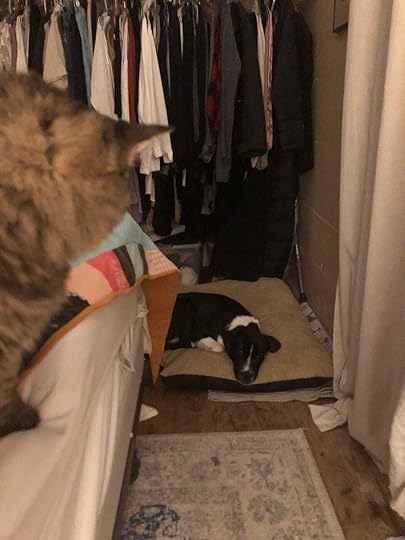 Grace regarding Manon from a lofty position
Grace regarding Manon from a lofty positionRight now as I write this in the early morning. Manon is in the bedroom with Gaywynn. They’re both sleeping. We’re planning on going to the dog park today if it doesn’t rain. It’s cold—for Louisiana. High 45 degrees today. So we may not.
Despite her not warming to me, I’m becoming quite fond of her. She’s gotten under my skin. Dogs can do that. I just have to remember to put my shoes away at night.
January 27, 2023
Food things that irk me, part 2
Part 1 was vegetarians. I wrote, with some glee, about vegetarians who come for dinner and don’t forewarn you about their uncompromising diet, so that you have to scramble to accommodate them.
Today’s peeve is sharing at restaurants.
I’m out to dinner with some friends. I go over the menu with great deliberation, and finally zone in, happily, on exactly what I want. Then the voice of one of my dinner companions erupts, usually quite chipper,
“We’re all sharing, aren’t we?!?”
“Of course!”
“You bet!”
“I love sharing!”
My answer is, usually, “No, thank you.”
Right now, you may be saying to yourself, oh, come on, what’s the big deal about sharing? It’s fun! You get to try everything that everyone orders! You’ll probably taste something new that you wouldn’t have ordered otherwise—and maybe even love it. Come on—lighten up!
Well, my answer is, I DON’T FUCKING WANT TO SHARE. After careful consideration, I’ve found exactly what I want and am hugely looking forward to having it all to myself. I want to savor every bite, from start to finish. It’s not as if you’re going to starve if I don’t share my food with you. You have your dish. I have mine. Isn’t that enough?
If you have never rejected the idea of sharing your food, let me tell you, the looks you get. The comments! It’s like the five stages of grief.
First, comes disbelief. They look at you like they didn’t hear you correctly. “He couldn’t really have said, ‘I don’t want to share.’ Impossible!” The second stage is they want to know why. “You don’t want to share? Why not?” I always give them an inadequate answer, “I’d just rather not.” The third stage is outrage, usually not openly expressed. Well, maybe some mutterings, “Well, if that’s how you want it….” They often look at you as if you’re a right wing fanatic. Or a left wing fanatic. Certainly anti-social. Probably un-American. The fourth stage is an uneasy silence while everyone waits for their food. The fifth and last stage is they give you one more chance when the food arrives.
“Are you sure you don’t want to share? It all looks so good! There’s more than enough for everyone!”
At this point, I’m feeling like Scrooge eating alone, wary-eyed, misanthropic, silent. But I’m not going to give in. I’m not going to change my mind. I’m loving this food, every single bite of it.
“No! Not now. Not ever! BON APPETIT!!!!”
January 18, 2023
An evening guest
We were inside our little house in rural Louisiana. It was after dark. My girlfriend got a text from our next door neighbor saying we had two owls in the trees in our front yard. Our neighbor is a birder like we are.
“Make sure the cat’s indoors,” she added.
After my girlfriend read me the text, I ran outside into the darkness. Right away, I heard them. Them, I say, because the hoots were coming from two different directions. They were deep, resonant hoots. They felt strong enough, profound enough, to travel great distances underwater. They went into your body. The night was crisp, with a trace of fog. I had my flashlight, one of those that casts a runway-illuminating-like beam. I pointed it upward into the trees around our house, but I couldn’t locate the owls.
Hearing this bird’s call is like hearing any wild animal’s call, or roar, or hiss, or screech, or bellow, or whatever sound they make. It creates awe. It brings wild into your heart. It also diminishes your ego. Pushes it aside for something you aren’t and never can be. The owl can do what it does better than you could ever imagine doing it. In fact, it can do what it does better than you do what you do. First of all, it doesn’t think. It reacts. Its mind doesn’t put up barriers between itself and its purpose. Like we do.
What is it, about owls? They are birds, but, somehow, they transcend that category.
Once again, I heard a three-beat—or was it four-beat?—series of hoots. Very distinct. Despite pointing my searchlight into the trees where I thought the calls were coming from, I still couldn’t see either owl. It was tantalizing and frustrating, as birding often is.
Pause. What kind of owl was I hearing? I listened to the various owl calls on my Audubon app, and, as I suspected, they were Great Horned Owls I was hearing. I checked the range just to make sure. The Great Horned is everywhere, from Alaska to Brazil. I’d never seen one, though. Maybe tonight.
Here’s what Cornell U.—they have a terrific birding site on the web—says about the Great Horned Owl: “With its long, earlike tufts, intimidating yellow-eyed stare, and deep hooting voice, the Great Horned Owl is the quintessential owl of storybooks.”
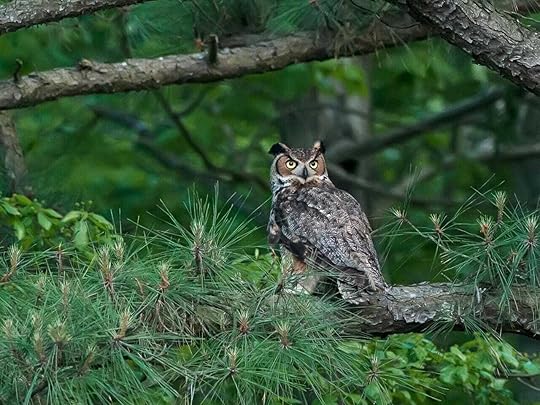 Looks like a Roman emperor posing for a statue. (Photos from Cornell)
Looks like a Roman emperor posing for a statue. (Photos from Cornell) Diet? From Audubon.org: “Aggressive and powerful in its hunting, it takes prey as varied as rabbits, hawks, snakes, and even skunks, and will even attack porcupines, often with fatal results for both prey and predator.” What? What a sight that must be, to come upon the two of them caught in a mortal embrace!
Here is a short, slightly melodramatic, but impressive National Geographic video of the Great Horned Owl hunting.
I walked around and around, trying to locate the source of these deep hoots. They were thrilling to hear. I could have followed them for hours. No luck.
But then. Yes, we even have a “but then” here. I heard a deep hoot coming from high up the giant live oak that’s right next to our house. I raised my beam to the branches. Nothing. Then—whoosh!—I saw, right above me, the owl take off and fly easily away, large wings moving the air like a swimmer. The wings were unmistakably white underneath. My flashlight, at last helpful, illuminated the whiteness clearly. Off it went, somewhere.
Are the Great Horned Owl’s wings white underneath?
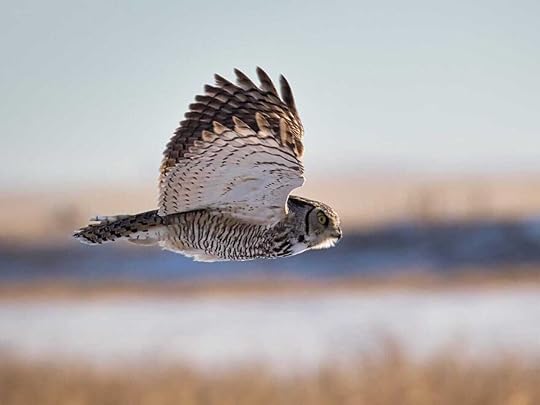
I went back inside and breathlessly told my girlfriend about this. What’s more exciting than seeing a Great Horned Owl take off from one of our trees, unmistakable, and fly away into the darkness? An ordinary evening was no longer ordinary.
January 9, 2023
Bad dreams
There was a period in my life years ago when I had nightmares. When I woke up—usually because of the bad dream—I was in a state of terror. That word, “terror,” is not an exaggeration. The word means “a state of intense or overwhelming fear.” I was often trembling, lathered in sweat, heart racing.
I can still remember a nightmare I had in Chicago over forty years ago, one of a steady series of bad dreams I had back then. I remember a cat being swung around by its tail and screaming, a pitched, deathly wail. Was I swinging it? That cat screaming! Even now, just thinking of it brings back the old fear.
An especially bad nightmare takes you over completely. It bypasses all your defenses. It takes up residence. It doesn’t go away when you wake up. It stays with you all day, clinging to your psyche like some slimy, malevolent creature.
You can’t believe it comes from you, this dream, it’s so ugly. But it has come from you. So those limbs being hacked off, that child drowning and begging to be saved, that woman being tortured, they come from you. You can’t turn to anyone else for its origin. It’s your creation. It’s you.
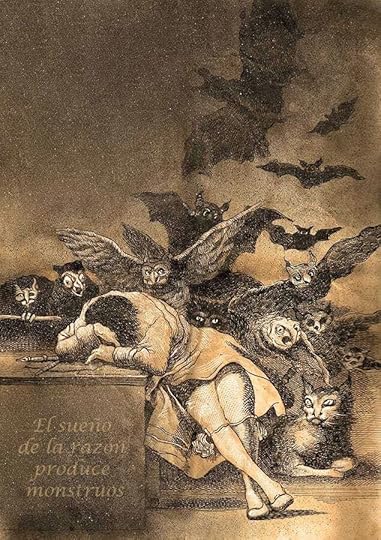 Goya’s version.
Goya’s version.But what you? You don’t summon these images when you’re awake, do you? They only come when you sleep. That’s when the proper, correct, good you is off guard. That’s when another you wakes up. When the unrestrained you takes over the helm. The raw you, in all its monstrosity. The real you.
But no! It’s only a dream!
That’s what you tell yourself all day, as the images come and go, flashing before you, whenever they want. You’re unable to stop them.
What have I done, you ask, to create these terrible images in my mind?
That’s the question, isn’t it?
January 1, 2023
Junior League
For my entire life, I’ve had the same name as my father—except with a diminutive tacked on at the end.
I am a junior. Or, as normally depicted, “Jr.”
His name was—he’s passed away—Richard C. Goodman. My name is Richard C. Goodman, Jr. Being a junior made me feel like I everything I did, or had, was smaller. My brain, my accomplishments, my room, my penis—you name it.
After all, what does the word “junior” mean? “Of lower rank or standing,” says my dictionary. I didn’t have my own unique name. My brother, John did. My sister, Mary did. Even my dog, Nikki did.
Though I hated writing my name with “Jr.” at the end, I hated saying it more. My mouth would tighten when I got to the end of my name, like I was chewing glue.
“What’s your name?” someone would ask me in any number of daily situations.
“My name?”
“Yes. What…is…your…name?”
“Richard Goodman…Ju…Ju…”
“What? I can’t hear you.”
“Ju….ni…”
“What?!?”
“Junior, Godammit! JUNIOR!! Richard Goodman, JUNIOR!! There! Now, are you happy????”
At least—thank God for small favors!—they didn’t call my father Big Richard and me Little Richard. Imagine the taunts, living in the 1950s South, as I did: “You’re Little Richard! Well, Whop-bop-a-looma-a-whop-boom-bam!”
Here’s the worst, though: My father’s nickname was Dick. It almost makes me crazy to contemplate Big Dick and Little Dick. You may laugh, but my own aunt was called Little Elsa and her mother Big Elsa. It happens and not just in Tennessee Williams plays.
Parents, take ten minutes out of your day and give your newborn child his own frickin’ name. What is it with this ego-mania drive to give your kid your name? Quell that! He's not like a building to be named after yourself. Or a boat. He's probably not even going to be anything like you. You're a Republican businessman? Well, he'll probably end up acting off-Broadway, voting for whatever Bernie-like candidate who's running and picketing your company. By that time, you'll want him to have a different name. So, do it now and save yourself the trouble.
One of you is enough, don’t you think?
December 24, 2022
Thinking of Kevin Lippert
It’s Christmas Eve, and I’m thinking about a lot of things, with some wistfulness, as we normally do this time of year. I’m thinking of how fortunate I am to be here, at my sister’s home in Denver, in the warmth of her family, with Gaywynn, my girlfriend, all of us happy and healthy. It’s a lovely embrace.
From time to time in the last few days, I’ve been thinking of Kevin Lippert who died March 29 of brain cancer. He was just 63. He was a friend of many years, and I miss him. He left behind two grown sons, Christopher and Cooper, a young daughter, Kate, and his wife, Rachel. There was a very good obituary the New York Times wrote about Kevin that will tell you about how he founded the esteemed Princeton Architectural Press and about his many accomplishments through the years as a publisher and mentor to architects and writers.
I met Kevin about twenty years ago. His older son and my daughter went to the same high school. We met at a parent-teacher conference one evening. I learned he was a publisher, and he learned I was a writer, and we were off. We became friends. Through the years, we would meet for lunch near his offices in the East Village in New York and, in the summer, in Maine where we both escaped for a few weeks each year. It was always a delight to see him.
 Kevin
KevinI’m thinking of Kevin now, because I miss him, and because I’m sure it must be difficult today, and will be tomorrow, for his wife, Rachel and especially for his daughter, Kate, who will be spending her first Christmas without her father.
I’m also thinking about Kevin because he was a man of qualities. He was most generous, and giving, and it seems to me that if this season signifies anything, it should signify good will toward men and women, and no one I’ve ever met embodied good will more than he did. I wish he were here.
December 17, 2022
My Carolina wren
There is a Carolina wren that bursts forth in song every morning here where in live in rural Louisiana. The bird is little, but its song is big. Such a mighty sound from such a tiny creature! I’m thrown every time. Its singing could reach the balcony, third tier, no problem. Have a listen to this YouTube video. You only need to watch the first thirty seconds to see, and hear, what I mean.
From bill tip to tail tip—as the great Roger Tory Peterson measured birds—the Carolina wren is 5 1/2 inches long. He calls it “a large wren”! Thryothorus ludovicianus, is the Linnaean classification. Dig this, from Wiki: “its specific name ludovicianus is a Latin term (derivative from Louis XIV) that means ‘of Louisiana’ that identifies the locality of the specimen collected near New Orleans.” Not far from where I am, near Lafayette, Louisiana, in the depths of French-speaking Cajun country.
 Love that cocky tail. (All photos from Audubon)
Love that cocky tail. (All photos from Audubon)Here’s how Peterson describes wrens in general, “Small, stumpy, energetic brown birds; slender, slightly decurved bills; tails often cocked.” Roger, Roger, Roger. Stumpy? With its tail jauntily pointed in a 45 degree angle upward—why do I find that so bloody attractive? Their range is fairly big, with a swath that includes the Mid-Atlantic states, all of the South, and even out to Oklahoma. According to Audubon.org, its conservation status is “probably stable, maybe even expanding.” God, it’s so nice to hear that once in a while.
It’s diet? Mostly insects. And listen to this, again from Audubon: “May mate for life. Pairs remain together all year, defending permanent territories.” Mate for life always sends a shot of sweetness through me.
This little Caruso makes me feel so good in the morning. It belts out its song, described by Peterson as “tea-kettle, tea-kettle, tea-kettle.” But that makes it sound silly. Did you watch the video? Tea-kettle? It’s simply music.
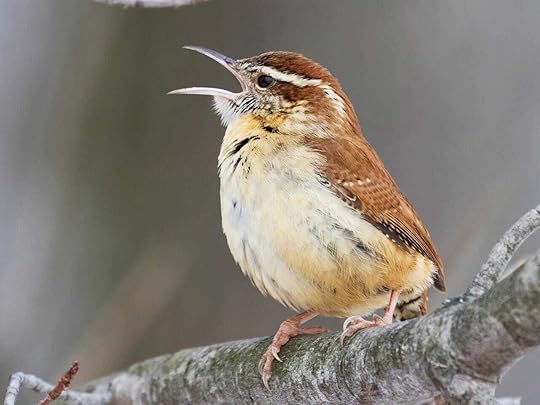 O sole mio…
O sole mio…The Carolina wren in my bushes and trees is not only a great singer, but friendly. I would go so far as to say amiable. More than a few times I’ve seen him land and perch only a few feet away from me. (I know it’s a he, by the way, because only the males sing.) There’s something uplifting about a little bird that alights so near to you that you can almost touch it. It makes you feel that you’ve done something worthy to deserve this intimacy. The bird doesn’t fear you. It trusts you. (Can birds trust?) Ergo, you must be a good person. You’re trustworthy.
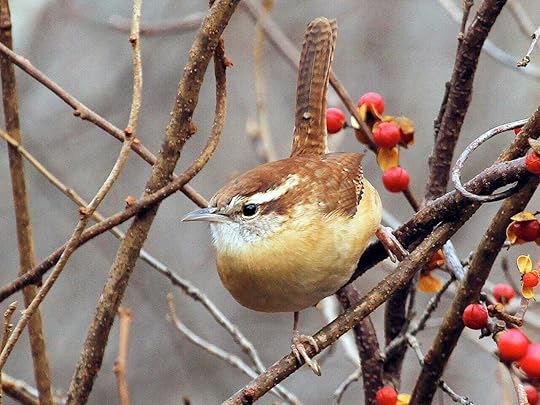 What a dandy little bird.
What a dandy little bird.Sometimes I go into the woods near our home to pee, because what’s better than peeing outdoors? I will often see the little wren flying from branch to branch in the canopy above. I know it sees me. I brashly think it actually remembers me. Who knows? Maybe he does. I know I’m glad to see him.
The songs of birds always make me feel optimistic, particularly in the morning. The Carolina wren’s song, especially so. The day looks bright and full of possibility after I hear its full-throated song. As they say down this way, “Merci, mon très petit oiseau.”
December 10, 2022
New York Noodletown
I should have known when I saw the new lighting fixtures.
I’ve been going to New York Noodletown for over thirty years. It’s a dive of a place in New York City’s Chinatown. It’s small, unpretentious and the food is consistently delicious and cheap.
The place does not serve traditional dishes, the kind you go to a typical Chinese restaurant for. They’re known for their noodles, yes, but also for their various embodiments of wonton soup. I would often ride my bicycle down from Greenwich Village where I lived early on a Saturday or Sunday morning. Especially in the winter, there were few New York experiences as uplifting as entering New York Noodletown on a chill day, my body surrounded by cold, greeted by inside warmth and the smell of rich, heady broth. Hunger was satisfied there. And many other emotions, including wonder. I would walk out, belly full, spirits rising, state of mind, optimistic.
When I came during the day I would often have one of their rice dishes, usually pork or duck over rice. The dish would arrive, meat crisp and warm, rice steaming. The fowl and pork hung by hooks near the windows, having been roasted and cured in the kitchen. Also near the front, a worker wielded a cleaver with precision and force, arm raised high and then descending onto the duck or pork, chopping it into portions to be placed over the rice. Next to him, were three or four large containers of broth into which the worker placed the wonton dumplings to make the soup. You could see it all happening as you ate at one of the circular tables you often shared with other diners, often Chinese.
The last time I was there, it was closed for renovations. I was disappointed, but relieved it wasn’t closed for good. In the meantime, I had been telling my girlfriend about New York Noodletown for months. I was excited to take her there. It’s always exciting to take someone you care about to a place where you love to eat.
Now, here we were. We sat down and each ordered one of the rice dishes. She, duck. Me, pork. I was anticipating her joy and sublime pleasure in eating this food. Plates arrived. Forks raised. Then…what? The meat was cold. Yes, cold. COLD. Not only that, but my pork was all fat, no meat. The rice was lukewarm. I felt downcast that I had created so much anticipation. It was then that I looked around and saw the changes in the restaurant. The so-called renovations.
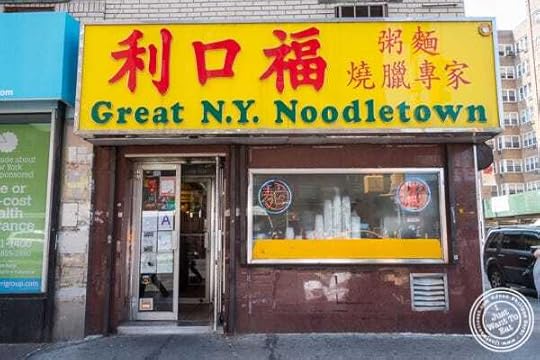 Say it ain’t so.
Say it ain’t so.I should have known when I saw the new lighting fixtures. They were gaudy and out of place for a dive, better suited for a chain. I should have known when I didn’t recognize anyone who worked there. I should have known when the area where the worker cleaved the duck and pork was now obscured by a barrier.
Why was I so disappointed? It was just a meal. Why did I feel so deeply disappointed about the transformation of a great place into a mediocre place? Clearly, the restaurant had changed hands. Clearly, the standards had plummeted. So what? As I said, it was just a meal.
No, not really. No, it’s not just a meal. A restaurant you love and frequent loyally, especially one that is not pretentious and doesn’t make a ton of money, becomes part of your life. You embrace it, feel close to it, treat it like a friend, defend it, believe in it, feel protective of it. When, all of a sudden, it changes and no longer gives the best it can, you feel betrayed. You have been their ally. You have carried them in your heart. What you have for them is love, not just an appetite. How could they?
I left, knowing I wouldn’t return. That love affair is over. Now, funny as it may seem, I’m in mourning.



